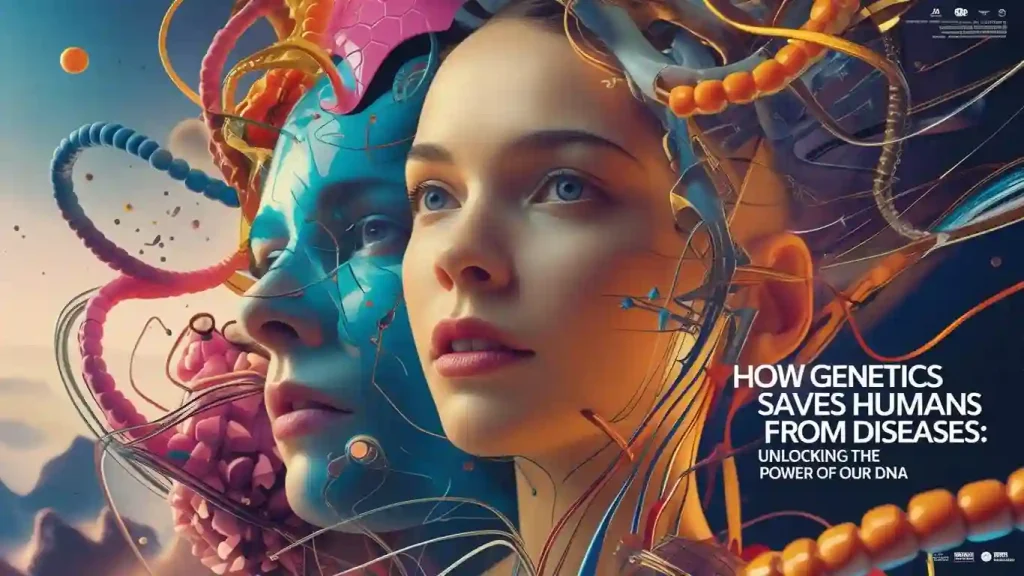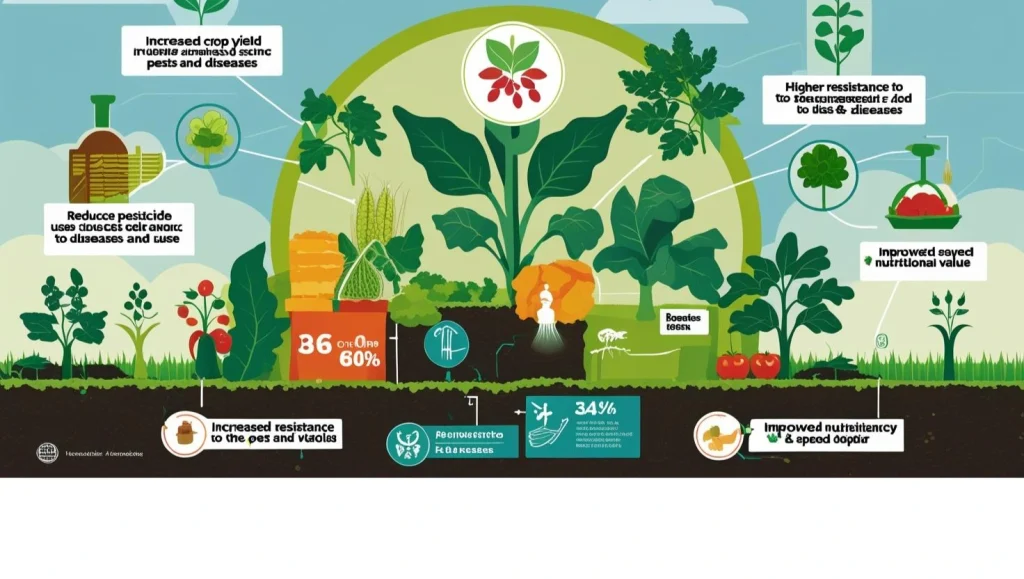
Genetic research is reshaping modern approaches to disease prevention, diagnosis, and treatment. By studying our DNA, scientists can uncover secrets hidden in our genes, helping us fight illnesses before they even start. From catching diseases early to creating personalized medicines, genetics is a game-changer in modern healthcare. In this article, we’ll dive deep into how genetics saves humans from diseases, exploring its mechanisms, real-world applications, and future potential.
What Is Genetics and Why Does It Matter?
Genetics is the study of genes, the tiny instructions in our DNA that make us who we are. Every cell in our body carries DNA, which determines traits like eye colour and height. But genes do more than shape our appearance—they play a massive role in our health. Some genes can make us more likely to get certain diseases, while others protect us. By understanding these genetic codes, scientists can predict, prevent, and treat diseases more effectively.
The field of genetics has grown rapidly, thanks to advancements like the Human Genome Project, which mapped all human genes. Today, tools like genetic testing and gene editing are saving lives by stopping diseases in their tracks. Let’s delve into how advances in genetics are improving how we prevent and treat illnesses.
Also Read: Technology affect human evolution
How Genetics Helps Prevent Diseases
1. Spotting Risks Early with Genetic Testing
One of the biggest ways genetics saves humans from diseases is through genetic testing. This process analyses your DNA to find changes (mutations) that could lead to illnesses like cancer, heart disease, or diabetes. For example, mutations in the BRCA1 or BRCA2 genes increase the risk of breast and ovarian cancer. If a genetic test shows you carry these mutations, doctors can recommend preventive steps, like regular screenings or even surgery, to lower your risk.
Genetic testing can reveal what your DNA says about your future health. It lets doctors catch problems early, often before symptoms appear. Early detection means better outcomes, as diseases like cancer are easier to treat in their early stages. Testing is now widely available, affordable, and can be done with a simple saliva or blood sample.
2. Personalized Medicine: Treatments Tailored to Your Genes
Not everyone responds to medicines the same way. A drug that works for one person might not work for another—or worse, it could cause side effects. This is where personalized medicine comes in. By studying your genetic makeup, doctors can choose treatments that are more likely to work for you. This approach, called pharmacogenomics, ensures you get the right drug at the right dose.
For example, some people have a genetic variation that makes them process certain heart medications slowly, leading to dangerous side effects. Genetic testing can spot this issue, allowing doctors to adjust the treatment. Personalised medicine is already saving lives in areas like cancer treatment, where drugs like Herceptin are tailored to patients with specific genetic markers.
3. Gene Editing: Fixing Faulty Genes
What if we could fix broken genes before they cause disease? That’s the promise of gene editing, a cutting-edge tool in genetics. Technologies like CRISPR allow scientists to “cut and paste” DNA, removing harmful mutations or adding protective ones. This could stop diseases like cystic fibrosis or sickle cell anaemia before they even start.
In 2023, the FDA approved the first CRISPR-based treatment for sickle cell disease, a major milestone. Patients who once faced painful symptoms and a shorter lifespan now have hope for a cure. While gene editing is still in its early days, it’s already showing how genetics can save humans from devastating diseases.
Real-World Examples of Genetics in Action
Fighting Cancer with Genetic Insights
Genetics is transforming how we fight cancer, one of the world’s deadliest diseases. Genetic testing can identify people at high risk for cancers like breast, colon, or lung cancer. For example, actress Angelina Jolie famously underwent a preventive double mastectomy after learning she carried the BRCA1 mutation. Her story brought global attention to how genetics can empower people to take control of their health.
Beyond prevention, genetics helps doctors choose the best cancer treatments. Tumors often have unique genetic profiles, and drugs can now target these specific mutations. This approach, called precision oncology, has led to better survival rates for cancers like leukemia and melanoma.
Tackling Inherited Diseases
Some diseases, like Huntington’s disease or cystic fibrosis, are passed down through families. Genetic testing allows couples to check if they carry these genes before starting a family. If both parents are carriers, techniques like in vitro fertilization (IVF) with preimplantation genetic diagnosis (PGD) can ensure their baby is born without the disease. This is a powerful way genetics saves future generations from suffering.
Protecting Against Heart Disease
Heart disease is another area where genetics shines. Certain gene variants increase the risk of high cholesterol or heart attacks. By identifying these variants, doctors can recommend lifestyle changes, like diet and exercise, or prescribe medications to lower cholesterol. Genetic insights also guide the use of blood thinners, ensuring patients get the right dose to prevent strokes or clots.
The Role of Genetics in Infectious Diseases
Genetics isn’t just about inherited diseases—it also helps fight infections. Some people are naturally resistant to diseases like HIV or malaria because of specific genetic mutations. For example, a mutation called CCR5-delta32 makes some people immune to HIV. Scientists are studying these natural defenses to develop new vaccines or treatments.
During the COVID-19 pandemic, genetics played a key role in understanding why some people got severely ill while others had mild symptoms. Researchers found genetic factors that affect how the immune system responds to the virus. This knowledge is helping create better treatments and vaccines for future pandemics.
Also Read: Endangered Species – 7 Ways Genes Can Save them
The Future of Genetics in Disease Prevention
The future of genetics is bright, with new discoveries happening every day. Here are some exciting trends to watch:
1. Widespread Genetic Screening
- Soon, genetic testing could become a routine part of healthcare, like a blood test or checkup. Newborns might be screened for hundreds of genetic conditions, allowing early interventions. Adults could get regular genetic checkups to stay ahead of diseases like cancer or Alzheimer’s.
2. Advanced Gene Therapies
- Gene therapies are moving beyond rare diseases to tackle common conditions like diabetes or heart disease. Scientists are also exploring ways to “turn off” harmful genes without editing DNA, which could be safer and easier to do.
3. Artificial Intelligence and Genetics
- Artificial intelligence (AI) is supercharging genetics by analyzing massive amounts of genetic data. AI can spot patterns in DNA that humans might miss, leading to faster diagnoses and better treatments. For example, AI tools are already helping doctors predict which patients are at risk for certain cancers.
4. Ethical Challenges and Solutions
- As genetics advances, ethical questions arise. Who should have access to your genetic data? Could it be misused by employers or insurers? Scientists and policymakers are working to create strict guidelines to protect privacy while ensuring everyone benefits from genetic advances.
Why Trust Genetics for Your Health?
Genetics is backed by decades of rigorous research and real-world results. Leading institutions like the National Institutes of Health (NIH) and the World Health Organization (WHO) support genetic testing and therapies. Experts like genetic counselors and molecular biologists ensure that genetic tools are used safely and effectively. Plus, millions of people have already benefited from genetic testing, personalized medicines, and gene therapies.
However, genetics isn’t a magic bullet. It works best when combined with healthy habits like eating well, exercising, and avoiding smoking. Always consult a healthcare professional before making decisions based on genetic tests.
Conclusion: Genetics Is Our Shield Against Disease
Genetics and disease prevention go hand in hand, offering hope for a healthier future. From spotting risks early to creating tailored treatments, genetics is saving lives every day. As technology advances, we’ll see even more ways to harness our DNA to fight diseases. By embracing genetic testing, personalized medicine, and gene editing, we can protect ourselves and future generations from illness.
To explore your genetic health, it’s best to speak with a healthcare professional or genetic counselor. You can also explore trusted resources like the NIH’s genetics website or ask about testing options at your next checkup. Genetics isn’t just science—it’s a superpower that’s helping humans live longer, healthier lives.
FAQs
How can DNA help cure diseases?
DNA helps cure diseases through gene therapy, which replaces or repairs faulty genes to restore normal cell function. Techniques like CRISPR can edit mutated DNA, offering potential cures for genetic disorders like sickle cell anemia and cystic fibrosis.
Why DNA & Data Will Shape the Next Generation of Preventative Medicine?
DNA reveals your unique health blueprint, while data-driven tools predict risks before symptoms appear—enabling truly personalized prevention. Together, they shift healthcare from reactive treatments to proactive, precision-based wellness strategies.
What is the main function of genetics?
Genetics studies how traits are inherited and how genes control growth, development, and biological functions through protein synthesis.
What would happen if cells did not have DNA?
Without DNA, cells couldn’t make proteins, reproduce, or carry out vital functions—life as we know it wouldn’t exist.
How long does DNA last after death?
DNA begins to degrade after death, but under cold, dry conditions, fragments can survive for thousands—or even millions—of years.

